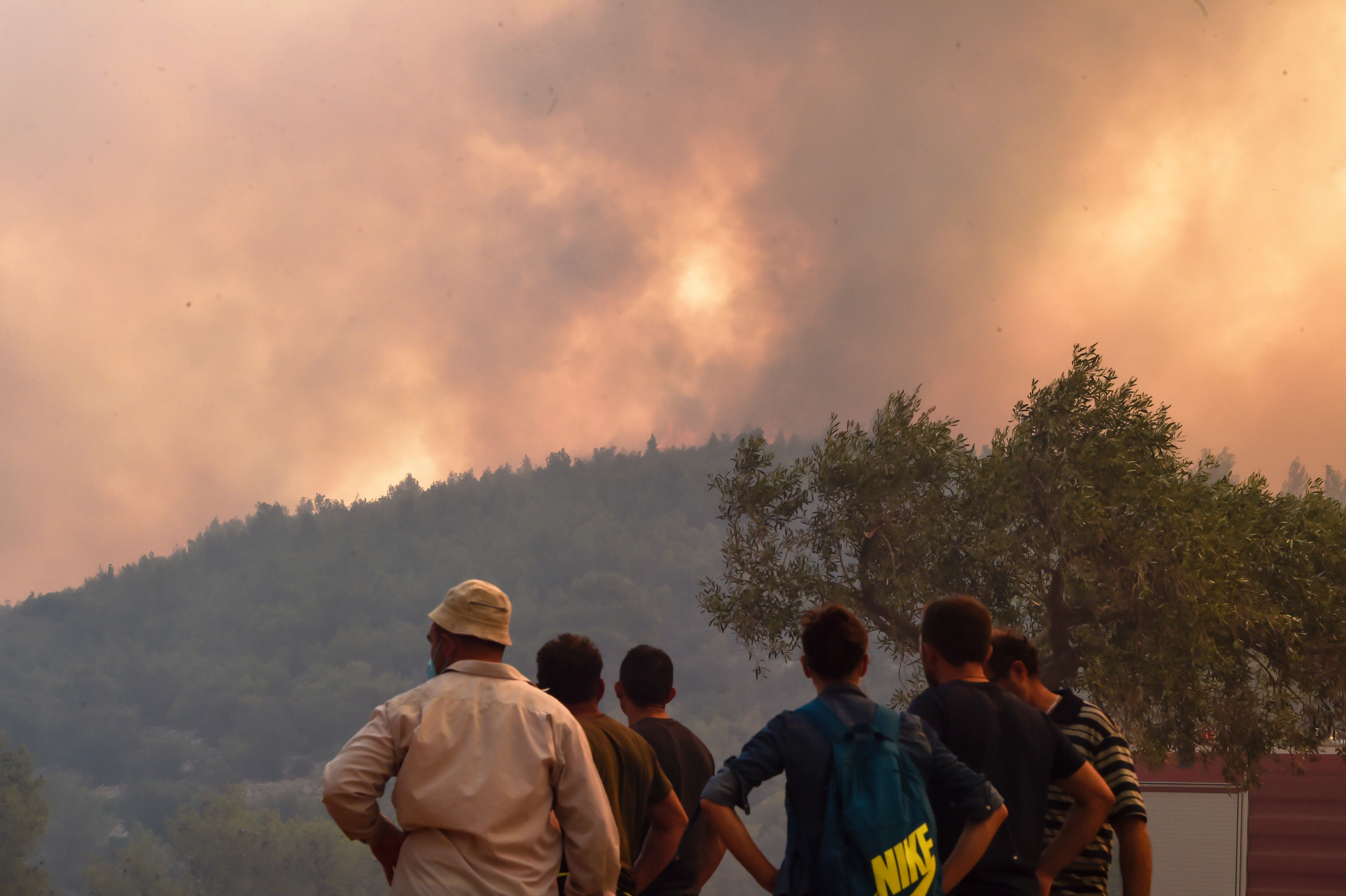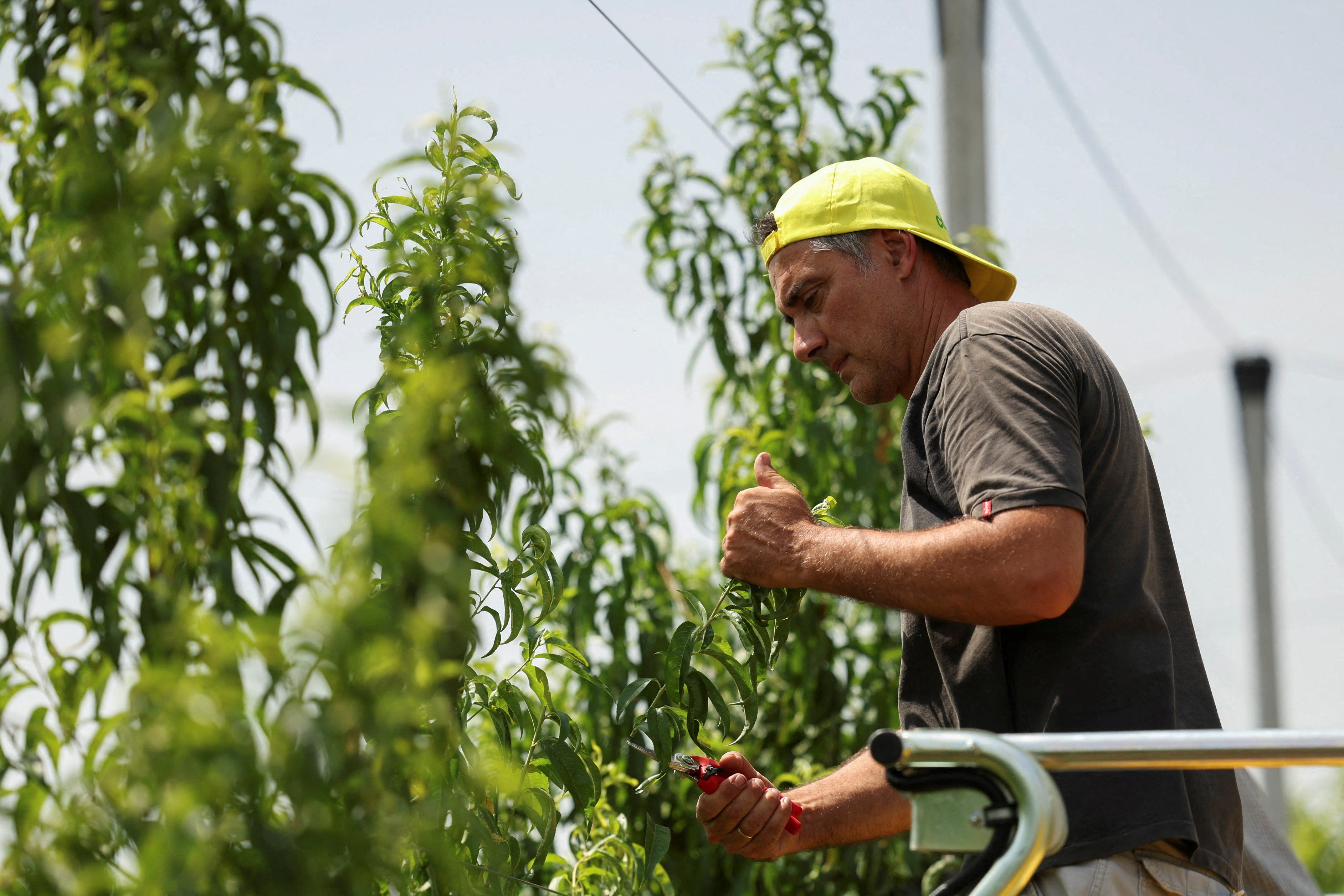European heatwave - latest updates as red alerts and record temperatures continue
Authorities warn of heightened risk of fires from today
Your support helps us to tell the story
From reproductive rights to climate change to Big Tech, The Independent is on the ground when the story is developing. Whether it's investigating the financials of Elon Musk's pro-Trump PAC or producing our latest documentary, 'The A Word', which shines a light on the American women fighting for reproductive rights, we know how important it is to parse out the facts from the messaging.
At such a critical moment in US history, we need reporters on the ground. Your donation allows us to keep sending journalists to speak to both sides of the story.
The Independent is trusted by Americans across the entire political spectrum. And unlike many other quality news outlets, we choose not to lock Americans out of our reporting and analysis with paywalls. We believe quality journalism should be available to everyone, paid for by those who can afford it.
Your support makes all the difference.Firefighters battled a blaze in Rhodes as a new heatwave loomed over Greece, threatening to stoke tinderbox conditions across the country.
Greek meteorological service had warned of a heightened risk of fires from Thursday, as the country recovered from the first major heatwave of the summer.
A second heatwave was forecast to start on Thursday, with temperatures exceeding 40 degrees Celsius (104 degrees Fahrenheit) in some areas, and rising further on Friday to a maximum of 44C.
Thousands have also been evacuated in the Canary Islands and Switzerland in recent days, as southern Europe is gripped by ongoing wildfires and extreme heat caused by the fossil-fuel-driven climate crisis.
Fires are common in Greece, but hotter, drier and windy summers have turned the Mediterranean into a wildfire hotspot in recent years.
Temperature records were shattered in Rome and Catalonia on Wednesday as most of Italy’s big cities were placed under a red alert.
Thank you for tuning in today. We will be pausing updates for now.
‘1.5C is probably out of reach,’ climate change chair says
Speaking to the World at One programme about the government’s climate targets on BBC Radio 4, Lord Nicholas Stern said: “I think 1.5 is probably out of reach even if we do accelerate quickly now. But we could bring it back if we bring down the cost of negative emissions and get better at negative emissions.”
When asked if the government has a problem with its climate targets, he said:“Yes, up until Cop26 we really made very good progress in terms of commitments from government in terms of increasing commitments to finance and very important in terms of commitment from the private sector.”
Summer heatwave set to blast the UK for school holidays
Britain can expect a late summer heatwave to bring a wave of sunshine during the school holidays, despite a miserable start to July.
The deadly Cerberus heatwave, which has caused wildfires and deaths across Europe, is now threatening to flick its tail end across the UK.
However, while Europe continues to sizzle under an intense heatwave, temperatures in the UK over the next week are not expected to rival those felt in Italy and Spain, with averages of 20C - 23C in London over the coming days.

Summer heatwave set to blast the UK for school holidays
Blaze near Athens contained but authorities stay on alert as Europe heatwave continues
Greece’s fire service have intensified water drops west of Athens where a huge blaze was contained overnight - as authorities brace for a new round of extreme weather.
Seven firefighting planes and nine helicopters were operating in the area, including four planes sent from Italy and France as part of a European Union support mechanism.
Searing heat across Europe’s Mediterranean south has maintained a high or very high risk of fires in Spain, Italy and Greece.
Greek Prime Minister Kyriakos Mitsotakis said the fire service and civil protection authority will remain on alert as a new heatwave moves east across Greece.
Temperatures are expected to reach 45C Sunday.
“The hard times are clearly not over yet,” Mr Mitsotakis said.
“We are facing another heatwave and a possible strengthening of the winds. So absolute vigilance and absolute readiness are required over the next few days.”

Europe heatwave: Is it safe to travel to Italy, Spain, Greece and Croatia?
Travellers from the UK, US and elsewhere in the world may be looking with concern at planned trips to the Mediterranean.
As the busiest summer getaway since 2019 begins, travellers to southern Europe are likely to experience extreme heat. An area of high pressure appears to have settled over the Med with little sign of abating.
The deadly “Charon” heatwave (so named by Italian meteorologists) is gripping southern France, Spain, Italy, Croatia, Greece and Turkey, as well as smaller countries in the Mediterranean region.
For travellers contemplating their options, these are the key questions and answers.

Europe heatwave: Is it safe to travel to Italy, Spain, Greece and Croatia?
Scientists warns global temperature reach 1.5C could trigger irreversible tipping points
Scientists have warned that allowing the global average temperature to reach 1.5C could trigger irreversible tipping points that would heat the Earth beyond our control to unpredictable and dangerous levels.
Melting of polar glaciers and sea ice, die-back of the Amazon rainforest and coral reef extinction are all seen as being on the edge of tipping over into a feedback loop of self-destruction, whereby their decline itself becomes a source of warming.
The Earth has already warmed by around 1.2C, which has exacerbated heatwaves and wildfires that have caused thousands of deaths and millions of dollars of destruction and has led to the oceans heating to previously unseen levels.
Pascal Soriot, CEO of the pharmaceutical giant AstraZeneca, said seven million people are already being killed by climate change around the world - as many as those killed by Covid.
In response to a question about the economic impacts on people of cutting emissions rapidly, Prof Watson said: “It’s in their absolute best interest to tackle climate change, net zero by 2050, large reductions this decade.
“If we don’t, we’re going to see more heatwaves, more adverse effects on health, we’re going to see agriculture food production threatened, we’re going to see problems with water quantity and water quality.
“We’ll see more floods, more sea level rises displacing people on coastal areas, lots of adverse health effects.”
In a separate interview with the former BBC and now independent environment journalist Roger Harrabin, Prof Watson said current policies are “totally inadequate” and that world leaders had made a “terrible mistake” in prioritising inflation, the pandemic and the Ukraine war over the climate.
He also warned that the polar regions are melting faster than scientists predicted and that weather events, such as heatwaves and wildfires, have been much more devastating than previously thought.
“I am very concerned,” he said. “None of the observed changes so far are surprising. But they are more severe than we predicted. We probably underestimated the consequences.”
Italian farmer battles the elements as climate change takes its toll- part two
Andrea Ferrini’s troubles in 2023 started with a rare frost in April that halved production. The following month, rains and floods swept the region, killing 15 people, causing billions of euros’ worth of damage and hitting agriculture particularly hard.
According to the Coldiretti agricultural association, more than 5,000 farms were left under water in the region, which accounts for a third of Italy’s fruit harvest, including Ferrini’s smallholding.
“The flood meant that the plants, which were in the midst of a vegetative recovery (from the cold), suffered water stress and went into crisis,” Ferrini said.
Then came the heat, with record temperatures registered in many areas of Italy this past week.
“We are being hit hard by the heatwave which is putting the plants under strain. This is also because temperatures at night are not falling below 24 Celsius (75 Fahrenheit), which does not allow plants to grow properly,” he said.
A severe hailstorm proved the final blow for much of his fragile crop.
“The climate is overheating. We have a very warm sea and every time there is a cold weather front, we have thunderstorms, strong winds, hailstorms and these are becoming more and more frequent in the Po Valley,” he said.
Italian farmer battles the elements as climate change takes its toll
Farmer Andrea Ferrini is on the frontline of climate change in Italy and it is hurting.
First his fruit and corn crops in northern Italy withered in a hard frost, then they were hit by torrential rains and record flooding, followed by an exceptional heatwave and finally hail storms.
“It has certainly been a disastrous year,” said Ferrini. “Making money from my farm is becoming difficult with this changing climate. Even planning for future years is becoming really challenging.”
Ferrini, 52, has owned a farm in the fertile Emilia-Romagna region since 2003. He has 15 hectares (37 acres) of vines and orchards, which produce kiwi and peaches, and also grows corn.
In a normal year he produces around 1,000 quintals (100,000 kg) of fruit and grapes, but this year he expects to harvest no more than 200-300 quintals.
“I am discouraged, but I am not giving up,” he said, bowing his head as pent up emotions swell.

In pictures: Tourists cool off at Rome’s Trevi Fountain



World unlikely to limit temperature rise to 2C, warns climate scientist
A leading climate scientist has said he is “very pessimistic” about the world reducing emissions to limit the global average temperature to 2C above pre-industrial levels.
Professor Robert Watson, of the Tyndall Centre for Climate Change, told the Today Programme that failure to do so will result in more heatwaves, floods, sea level rise, crop failure and health problems.
Almost every country on Earth signed up to the Paris Agreement in 2015 to limit global temperature rise to 1.5C but if not, at the very least 2C.
Eight years later, emissions continue to rise and current policies have us on track for around 2.5C of warming by the end of the century, according to Prof Watson.
Many countries including the UK have made pledges to go net zero - balancing the amount of greenhouse gases emitted into the atmosphere with those absorbed - but most are several decades away from achieving that.
The UK has committed to going net zero by 2050 but Prof Watson, who has been chairman of the Intergovernmental Panel on Climate Change and scientific adviser to the UK and US governments, said current emissions need to be slashed in half before 2030 to have any chance of reaching the Paris goals.
He said: “I think most people fear that if we give up on the 1.5C, which I do not believe we will achieve - in fact I’m very pessimistic about achieving even 2C - but if we allow the target to become looser and looser, higher and higher, governments will do even less in the future.
“We need to try and hold governments to start to act sensibly now and reduce emissions. But even governments with a really good target, like the United Kingdom, don’t have the policies in place, don’t have the financing in place to reach those goals.”
Scientists have warned that allowing the global average temperature to reach 1.5C could trigger irreversible tipping points that would heat the Earth beyond our control to unpredictable and dangerous levels.



Join our commenting forum
Join thought-provoking conversations, follow other Independent readers and see their replies
0Comments